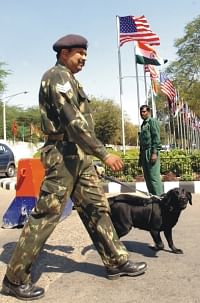What Bush wants in India
The Christian Science Monitor, Washington
President Bush and his policymakers like to stress how much 9/11 has changed America's foreign-policy objectives, but one goal the terror attacks did not alter is to build a stronger partnership with the world's largest democracy, India. When Bush arrives in India today, he will emphasise that same theme - one he has sounded since he was a governor running for president in 2000. At the top of the agenda are a controversial US-India nuclear-power agreement, proposed last summer when Indian Prime Minister Manmohan Singh visited Washington; security and economic ties; and India's relations with Pakistan, a country Bush will visit briefly on Saturday. But the specific discussion points, while important, fail to convey the broad geopolitical significance of both the trip and of the administration's intent to forge a strategic relationship. Closer US-India ties are "one of the most significant developments of the early part of the 21st century," says Kurt Campbell, an international security expert at the Centre for Strategic and International Studies (CSIS) here. Others close to the administration's thinking say India exemplifies what the Bush team sees as the future of a peaceful and prosperous world. Thus, they add, India should be encouraged as a partner. India is "a compelling example of what [the president] thinks can happen elsewhere," says Michael Green, recent national security director for Asian affairs, pointing to India's established democracy, its "150 million Muslims with no al-Qaeda," and its growing middle class. US-India relations have seemed to bud before and have suffered "false starts." Now, conditions favour a full bloom, in part because both countries appear to want it, experts say. "What used to be 'estranged democracies' are now 'engaged democracies,' " says Karl Inderfurth, a former assistant secretary of State for South Asian affairs who has accompanied two former presidents - Jimmy Carter and Bill Clinton - to India. "New Delhi has joined the list of capitals to which a US presidential visit is now imperative," says Inderfurth, now at the Elliott School of International Affairs at George Washington University. Bush seeks to cement relations with a huge and fast-growing economy, while at the same time building ties with India as a way to influence the other - but communist - giant in the neighbourhood, China. India sees a mature relationship with the US as a way to further its status as a world power - including, it hopes, a permanent seat on an expanded United Nations Security Council. India has worked to ease tensions with neighbouring Pakistan - a dangerous nuclear rivalry that escalated to the brink of war in 2002, requiring intense diplomacy from the Bush administration and delaying the grand opening to India the president had hoped for in his first term.
|

An Indian army soldier from the bomb squad is watched by a hotel staff where US President George W. Bush will stay during his India trip in New Delhi yesterday. India began a major security drill for US president's visit, calling out commandos and riot police for the world's most powerful man. PHOTO: AFP |